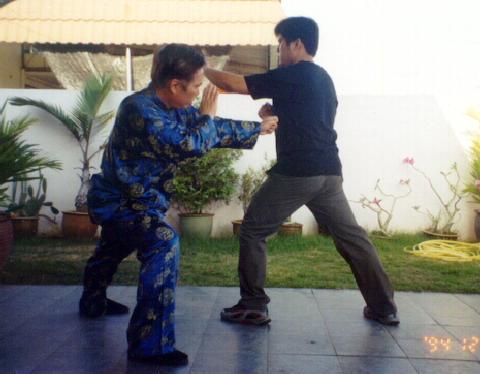KUNGFU STYLES AND INCORRECT ANSWERS

All kungfu styles are complete
Question
In addition, I don't feel that there is such a thing as “one style fits all.” What I mean is that certain traditional and not-so-traditional styles may be good for those who developed them, but not necessarily perfect for those who are taught them.
-- Phil, USA
Answer
If your term of reference is combat efficiency, you are right in your opinion if the style is incomplete, but wrong if the style is complete.
Some examples of what I would call incomplete styles are Karate, Taekwondo, Muay Thai, Kickboxing, Western Boxing and Wrestling. I do not mean any disrespect to these styles, and I would emphasize that an exponent of an incomplete style, in some situations, can be a better fighter than an exponent of a complete style.
What I mean is that there are certain combative techniques not included in the repertoire of an incomplete style. Hence Karate may be good for Karatekas who developed Karate, but may not be perfect for Wrestlers whom are taught Karate. In other words, if you are a Karate exponent, you can defend yourself well if your opponent uses Karate techniques to attack you, but you may be at a loss if he attacks you with Wrestling techniques.
On the other hand, virtually all kungfu styles are complete. In other words, the repertoire of a kungfu style provides sufficient material for the kungfu exponent to defend against any attack.
If you are a genuine kungfu exponent, irrespective of your kungfu style, if your opponent uses kungfu techniques to attack you, you can defend yourself well. If he uses Karate, Taekwondo, Muay Thai, Kickboxing, Western Boxing, Wrestling or other techniques to attack you, you too can defend yourself well. Hence, traditional kungfu styles are good for those who developed them, and also good for those who are taught them — provided, of course, they are taught genuine traditional kungfu.
Notwithstanding this, it does not necessarily mean that one style fits all. For various reasons, some may prefer Wing Choon Kungfu, others may prefer Praying Mantis, whereas still others may find learning Karate or Kickboxing more beneficial than learning a kungfu style.
Question
Studying martial arts always improves one's performance, but I think this mostly has to do with strategy, doing the unexpected (in a fight), speed, and power — all things that are readily taught in schools. These things can also be learned by an individual on the street, given enough time.
Answer
All the four points you mentioned above are incorrect!
One, practicing martial arts does not always improve one's performance. I would even go to the extent of saying that the way many martial arts are practiced today is detrimental to one's performance — in combat as well as in daily living. The amount of internal injuries one has sustained as well as his attitude in totally disregarding his own safety in sparring practice are serious negative factors in any performance.
Two, the two most important factors in any successful performance are mental clarity and harmonious energy flow, the two factors that are usually neglected and sometimes totally unknown in many martial arts practiced today. You may have good techniques, tactics and strategies, but if your mind is dull and your energy blocked, your speed and power as well as efficiency will be seriously affected in combat or daily work.
Three, mental clarity and harmonious energy flow, as well as strategies, doing the unexpected, speed, and power are not readily taught in schools. What typical schools readily teach you are techniques, which are often taught badly too. You are expected to use the same techniques against a young child or a tough adult, which means you are not taught strategies. You are expected to defend yourself the way others do, which means you are not taught doing the unexpected. You are not taught how to regulate your breathing according to the combat situations, which means you are not taught the fundamentals of speed and power.
Four, these things cannot be, and should not be, learned by an individual on the street. Even if we presume that they could be learnt on the street, he would not have any time. How often have you fought on the street to enable you to learn good strategies, doing the unexpected, speed and power? How likely would someone approach you with a gift, but suddenly pull out a dagger and thrust it into your stomach? A good fighter would escape unhurt because he has learnt and trained these things from his masters, who in turn has inherited them from generations of past masters.
The above is taken from Questions 3 and 4 of July 2003 Part 1 of the Selection of Questions and Answers.
LINKS
Courses and Classes
